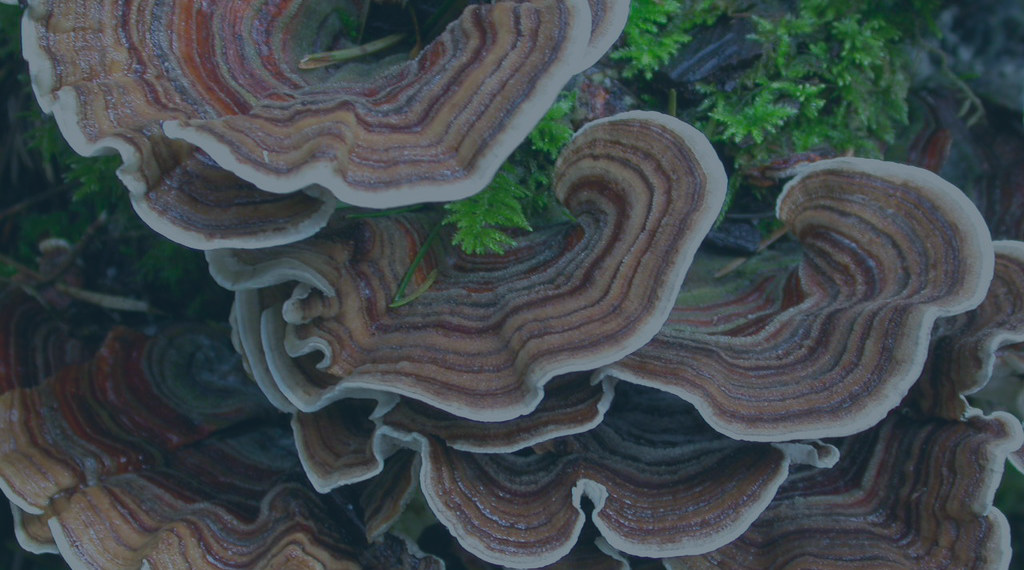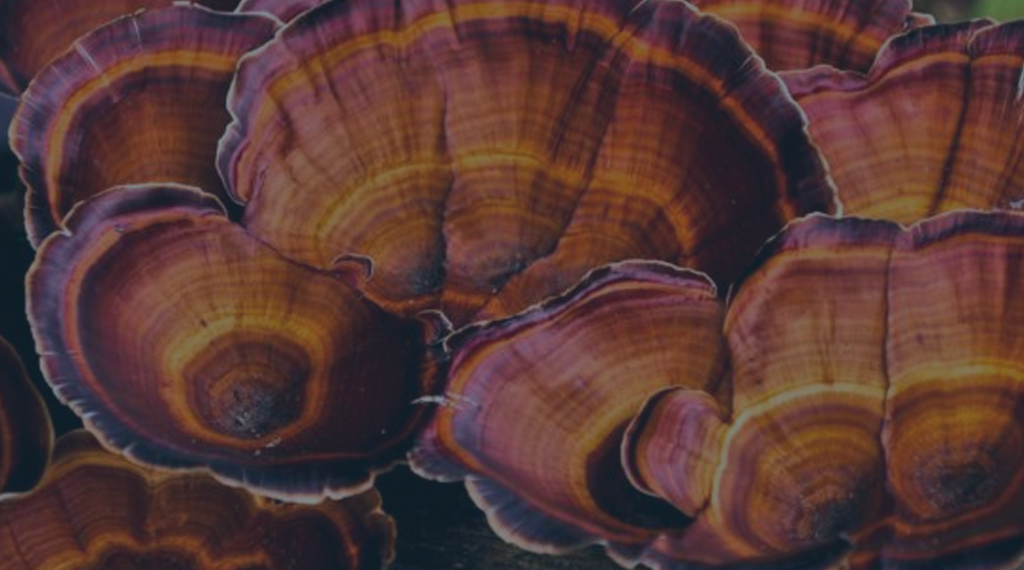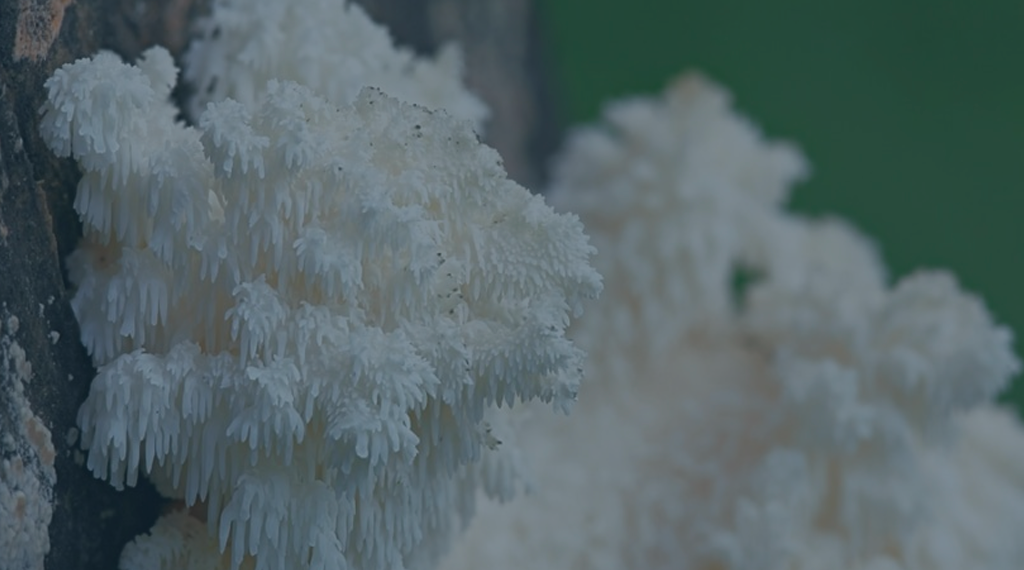Mushrooms & your health.
Mushrooms and their extracted compounds have been used for centuries in Eastern medicine. Today, Western science is actively conducting research into the potential health and well-being properties of these amazing fungi!
These are some of the publicly available research papers and studies that have been published that you may be interested to review.

Turkey Tail
Named because of the feather like appearance, turkey tail mushrooms (Trametes versicolor) has been used for its health benefits as long ago as the 15th century in China. While beautiful, it is not known as a gourmet food, but has long been used in traditional Japanese and Chinese medicine to boost immunity and to help with digestive and gut health.
Modern day research is being conducted in the areas of immune support and tumour fighting properties in conjunction with conventional medicine approaches, including how Turkey Tail mushrooms:
• Contain an impressive array of phenols, flavonoids and other antioxidants that can reduce oxidative stress, cell damage and inflammation
• May support the immune system due to the high level of polysaccharopeptides
• May help stave off tumour formation
• May enhance conventional cancer treatments
• Boost gut bacteria and digestion
Published research:
-Evolutionary and Biogeographic Insights on the Macaronesian Beta-Patellifolia Species (Amaranthaceae) from a Time-Scaled Molecular Phylogeny. Maria M. Romeiras, Ana Vieira, Diogo N. Silva, Monica Moura, Arnoldo Santos-Guerra, Dora Batista, Maria Cristina Duarte, and Octávio S. Paulo
• The lignicolous fungus Trametes versicolor (L.) Lloyd (1920): a promising natural source of antiradical and AChE inhibitory agents. Ljiljana Janjušević, Maja Karaman, Filip Šibul, Giuseppina Tommonaro, Carmine Iodice, Dragica Jakovljević, and Boris Pejin
• PSP activates monocytes in resting human peripheral blood mononuclear cells: immunomodulatory implications for cancer treatment. Sekhon BK1, Sze DM, Chan WK, Fan K, Li GQ, Moore DE, Roubin RH.
• Medicinal mushrooms as an attractive new source of natural compounds for future cancer therapy. Artem Blagodatski, Margarita Yatsunskaya,Valeriia Mikhailova, Vladlena Tiasto, Alexander Kagansky, and Vladimir L. Katanaev
• Purification, characterization, and antitumor activity of a novel glucan from the fruiting bodies of Coriolus Versicolor. Annoor Awadasseid, Jie Hou, Yaser Gamallat, Shang Xueqi, Kuugbee D. Eugene, Ahmed Musa Hago, Djibril Bamba, Abdo Meyiah, Chiwala Gift, and Yi Xin
• Polysaccharide K suppresses angiogenesis in colon cancer cells. YOSHIKI SATOH, TAKANORI GOI, TOSHIYUKI NAKAZAWA, YOUHEI KIMURA, YASUO HIRONO, KANJI KATAYAMA, and AKIO YAMAGUCHI
• Effects of polysaccharopeptide from Trametes versicolor and amoxicillin on the gut microbiome of healthy volunteers: a randomized clinical trial. Pallav , Dowd, Villafuerte, Yang , Kabbani, Hansen, Dennis, Leffler, Newburg, Kelly.

Reishi
Known in Japanese and Chinese cultures as the “King of Mushrooms and by Emperors as the 'mushroom of immortality', Reishi mushroom is used widely today to assist with good health. The Japanese Government officially recognises it as a cancer treatment, Western science is studying the positive effect Reishi may have on the immune system, lowering blood pressure and maintaining brain health.
Bitter to the taste in the wild, Reishi are best consumed in liquid form that has polysaccharides and other beneficial compounds extracted.
Research has been conducted in these areas:
• Immune system boost and reduction of inflammation
• Anti-tumour properties
• Liver health and detoxification
• Anti-inflammatory effects
• Improved cognitive function
• Improved respiration
Published research:
• Triterpenes from the spores of Ganoderma lucidum and their cytotoxicity against meth-A and LLC tumor cells. Min BS1, Gao JJ, Nakamura N, Hattori M.
• Ganoderma lucidum (Reishi) in cancer treatment. Sliva D.
• The effects of two different ganoderma species (Lingzhi) on gene expression in human monocytic THP-1 cells. Cheng CH1, Leung AY, Chen CF.
• Cellular and molecular mechanisms of immunomodulation by Ganoderma lucidum. Lin.
• Ganoderma lucidum (Reishi mushroom) for cancer treatment. Xingzhong JinJulieta Ruiz Beguerie Daniel Man‐yuen Sze Godfrey CF Chan
• Hepatoprotective Activity and the Mechanisms of Action of Ganoderma lucidum (Curt.:Fr.) P. Karst. (Ling Zhi, Reishi Mushroom) (Aphyllophoromycetideae) Yihuai Gao, Min Huang, Zhi-Bin Lin, Shufeng Zhou
• Encyclopedia of Dietary Supplements Edited ByPaul M. Coates, Joseph M. Betz, Marc R. Blackman, Gordon M. Cragg, Mark Levine, Joel Moss, Jeffrey D. White
• Anti‐Inflammatory and Anti‐Tumor‐Promoting Effects of Triterpene Acids and Sterols from the Fungus Ganoderma lucidum Toshihiro Akihisa Yuji Nakamura Masaaki Tagata Harukuni Tokuda Ken Yasukawa Emiko Uchiyama Takashi Suzuki Yumiko Kimura

Lion’s Mane
Or Hericium Erinaceus are named because of the gorgeous, shaggy cap that looks like a white pom-pom or a lion’s mane.
Delicate looking with icicle like tendrils hanging down, lion’s manes are actually a firm, meaty textured mushroom with a wonderful, subtle seafood (like lobster) flavour.
Even more than the wonderful eating, Lion’s Mane attracts more attention because of the growing research around some of the potential medicinal benefits it may hold:
-
Lion's mane mushrooms may enhance the immune system, partly by reducing inflammation and preventing oxidation.
-
It may be beneficial in the prevention or treatment of anxiety and depression
-
It is possible that lion's mane mushrooms might boost cognitive function
-
The antioxidant properties of lion's mane mushrooms may play a role in cancer prevention or treatment.
-
The mushroom may also boost immune function and encourage the growth of good bacteria in the gut.
Published research:
• Lai, P.-L., Naidu, M., Sabaratnam, V., Wong, K.-H., David, R.P., Kuppusamy, U.R., Abdullah, N. and Malek, S.N.A. (2013). Neurotrophic Properties of the Lion’s Mane Medicinal Mushroom, Hericium erinaceus (Higher Basidiomycetes) from Malaysia. International Journal of Medicinal Mushrooms, 15(6), pp.539–554.
• Wittstein, K., Rascher, M., Rupcic, Z., Löwen, E., Winter, B., Köster, R. and Stadler, M. (2016). Corallocins A–C, Nerve Growth and Brain-Derived Neurotrophic Factor Inducing Metabolites from the Mushroom Hericium coralloides. Journal of Natural Products, 79(9), pp.2264-2269.
• Chang, S.-T. and Wasser, S.P. (2012). The Role of Culinary-Medicinal Mushrooms on Human Welfare with a Pyramid Model for Human Health. International Journal of Medicinal Mushrooms, 14(2), pp.95–134.
• Friedman, M. (2015). Chemistry, Nutrition, and Health-Promoting Properties ofHericium erinaceus(Lion’s Mane) Mushroom Fruiting Bodies and Mycelia and Their Bioactive Compounds. Journal of Agricultural and Food Chemistry, 63(32), pp.7108–7123.
• Mori, K., Ouchi, K. and Hirasawa, N. (2015). The Anti-Inflammatory Effects of Lion’s Mane Culinary-Medicinal Mushroom, Hericium erinaceus (Higher Basidiomycetes) in a Coculture System of 3T3-L1 Adipocytes and RAW264 Macrophages. International Journal of Medicinal Mushrooms, 17(7), pp.609–618.
• JIANG, S., WANG, Y. and ZHANG, X. (2016). Comparative studies on extracts from Hericium erinaceus by different polarity reagents to gain higher antioxidant activities. Experimental and Therapeutic Medicine, 12(1), pp.513–517.
• Kim, S. P.; Kang, M. Y.; Kim, J. H.; Nam, S. H.; Friedman, M. Composition and mechanism of antitumor effects of Hericium erinaceus mushroom extracts in tumor-bearing mice. J. Agric. Food Chem. 2011, 59, 9861−9869
• Vigna, L., Morelli, F., Agnelli, G.M., Napolitano, F., Ratto, D., Occhinegro, A., Di Iorio, C., Savino, E., Girometta, C., Brandalise, F. and Rossi, P. (2019). Hericium erinaceus Improves Mood and Sleep Disorders in Patients Affected by Overweight or Obesity: Could Circulating Pro-BDNF and BDNF Be Potential Biomarkers? Evidence-Based Complementary and Alternative Medicine, 2019, pp.1–12.
• Wasser, S.P. (2017). Medicinal Mushrooms in Human Clinical Studies. Part I. Anticancer, Oncoimmunological, and Immunomodulatory Activities: A Review. International Journal of Medicinal Mushrooms, 19(4), pp.279–317.